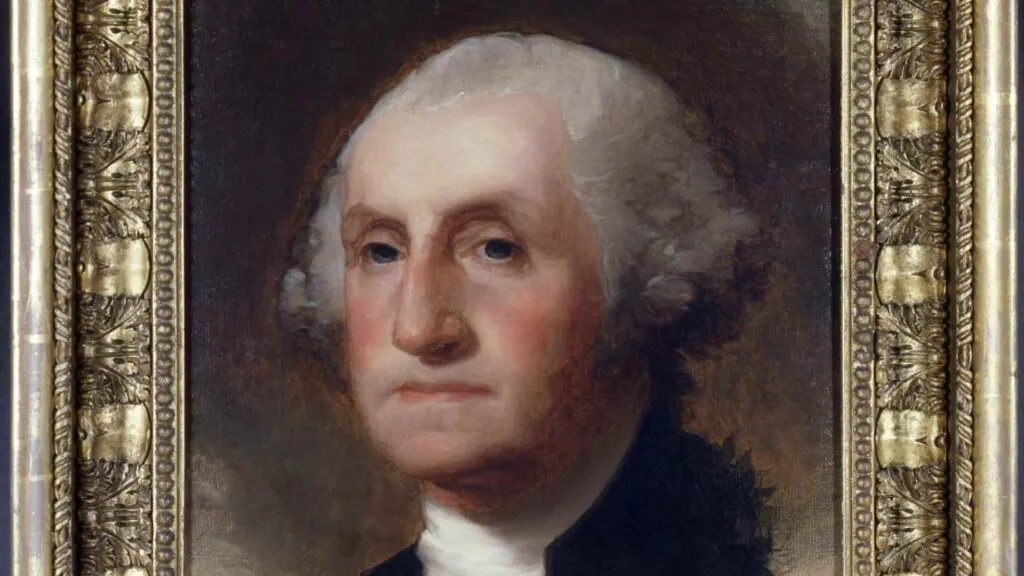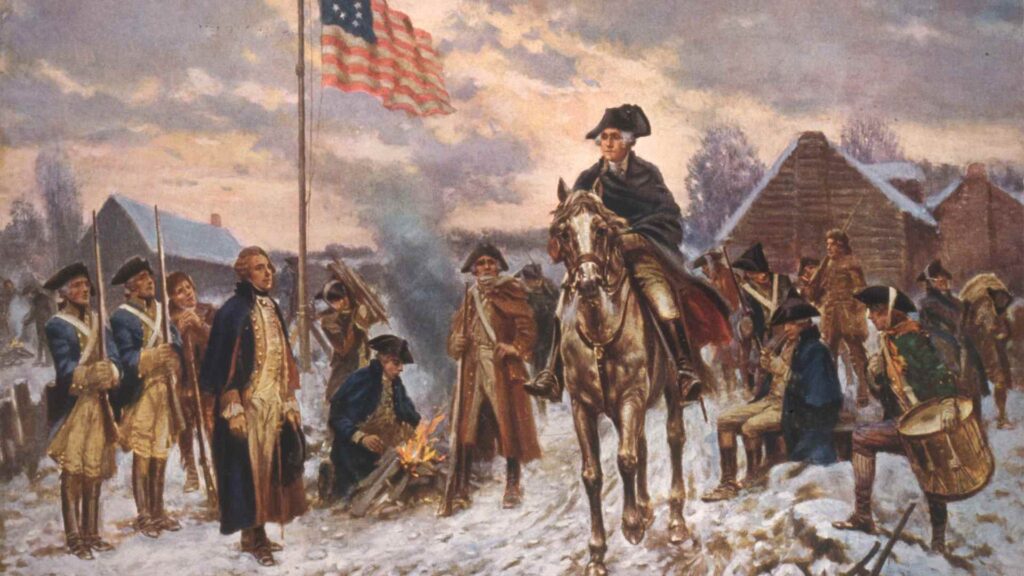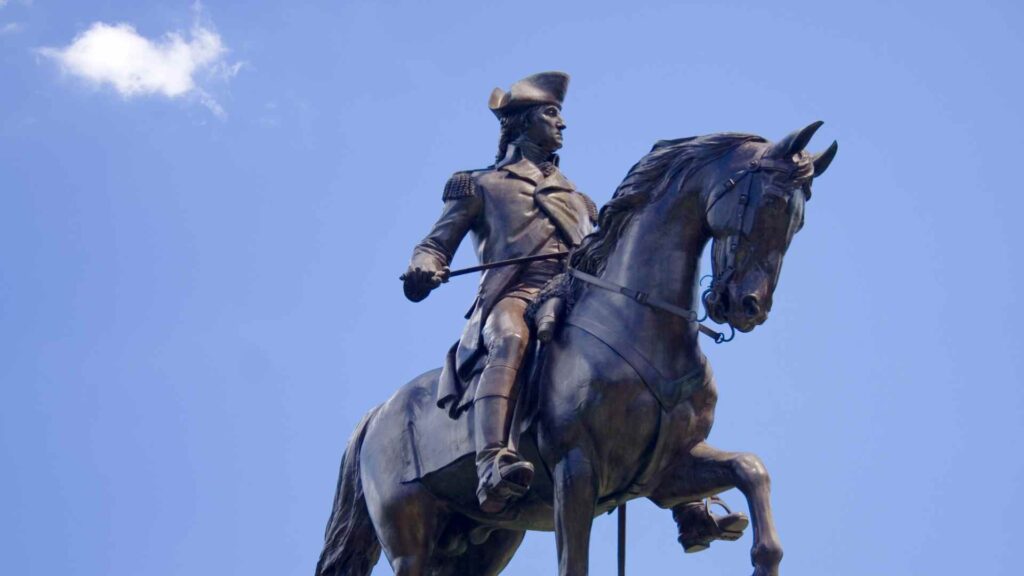George Washington, the first President of the United States, is a towering figure in American history.
Beyond his iconic image, he led a life full of fascinating details that often surprise people. Here’s the ultimate guide to fun facts about George Washington—featuring over 145 remarkable fun facts!
Early Life and Family Background
- George Washington was born on February 22, 1732, in Westmoreland County, Virginia.
- He was the oldest child of Augustine and Mary Ball Washington.
- Washington had six siblings and three half-siblings from his father’s first marriage.
- His father passed away when George was just 11 years old.
- Young George never attended college, unlike many of his contemporaries.
- He learned to survey land at a young age and was a surveyor by age 16.
- Washington’s family was wealthy but not considered part of the colonial elite.
- He inherited Mount Vernon from his half-brother Lawrence after his passing.
- The Washington family was originally from England, migrating in the 1650s.
- George was self-conscious about his lack of formal education and social background.
- He had a lifelong fascination with the military due to his brother Lawrence’s influence.
- As a young boy, George showed an early interest in outdoor activities and adventure.
- He had an English bulldog named “Sweetlips” and was a known animal lover.
- Washington kept personal records meticulously, showing an early interest in organization.
- By age 20, he was already a landowner and businessman, amassing land across Virginia.

Military Career and Revolutionary War
- George Washington began his military career with the Virginia militia.
- He played a significant role in the French and Indian War in his early twenties.
- Washington’s first major victory came with the capture of Fort Necessity in 1754.
- He gained invaluable experience in leadership and tactics during these early campaigns.
- Washington was respected for his bravery, leading from the front in many battles.
- Despite limited resources, Washington’s strategic mind often turned the tide in battle.
- He was chosen as the Commander-in-Chief of the Continental Army in 1775.
- Washington’s surprise attack on Trenton after crossing the Delaware River is legendary.
- He faced significant challenges in keeping his army supplied and motivated.
- Valley Forge tested Washington’s leadership, where his troops endured a brutal winter.
- Washington’s skills and character earned him deep loyalty from his soldiers.
- He personally dealt with deserters to set an example and enforce discipline.
- Washington utilized espionage and codes, making him an early proponent of military intelligence.
- His strategic alliance with the French helped win the Battle of Yorktown.
- After the victory, he willingly stepped down from power, a move that astonished the world.
Presidency and Leadership Style
- George Washington became the first U.S. President in 1789, serving two terms.
- He was unanimously elected by the Electoral College, a rare achievement.
- Washington preferred the title “Mr. President” over grand titles suggested by Congress.
- He aimed to establish a tone of impartiality and integrity in the new government.
- Washington personally inspected the construction of the White House.
- He established a cabinet with trusted advisors, including Jefferson and Hamilton.
- Washington’s neutrality policy in foreign affairs set a precedent for future presidents.
- He faced domestic challenges, such as the Whiskey Rebellion, which he quelled peacefully.
- Washington’s Farewell Address warned against political parties and foreign alliances.
- He set the tradition of a two-term limit, voluntarily stepping down after his second term.
- Washington often resolved conflicts within his cabinet through measured diplomacy.
- He refused a salary initially but later accepted one to avoid setting a negative precedent.
- Washington balanced federal power with states’ rights, aiming for national unity.
- His leadership style was calm, patient, and tactful, steering the young nation wisely.
- Washington laid the foundation for what would become the modern U.S. presidency.

Personal Life and Personality Traits
- George Washington was known for his reserved and dignified demeanor.
- He was over six feet tall, making him an imposing figure for his time.
- Washington loved to dance and was reportedly quite skilled.
- He had a fondness for fishing, hunting, and horseback riding.
- Washington was a dedicated farmer and experimented with crop rotation.
- He had a distillery on his Mount Vernon estate, producing whiskey.
- Washington was meticulous with his finances, recording every penny spent.
- Despite his tough exterior, he was known to have a kind and gentle heart.
- He enjoyed entertaining guests at Mount Vernon, frequently hosting gatherings.
- Martha Washington, his wife, was deeply involved in managing their estate.
- Washington had no biological children but raised Martha’s two children as his own.
- He wore dentures made from various materials, including ivory and lead.
- Washington was sensitive about his appearance due to his teeth issues.
- He had a lifelong aversion to debt and worked to remain financially independent.
- Washington kept his personal and public life largely separate, valuing privacy.

Mount Vernon and Agricultural Innovations
- Mount Vernon, Washington’s estate, was inherited from his half-brother Lawrence.
- Washington was passionate about agriculture, studying the latest techniques.
- He introduced crop rotation to increase soil productivity at Mount Vernon.
- The estate had over 8,000 acres, including farmland, gardens, and forested areas.
- Washington experimented with different crops like hemp, wheat, and corn.
- He operated one of the largest distilleries in America, producing rye whiskey.
- Washington’s fishery on the Potomac River was highly profitable.
- He designed a unique 16-sided barn for improved grain processing.
- Washington was among the first in America to breed mules for farming.
- He imported new livestock breeds to improve his estate’s productivity.
- Mount Vernon had a large staff of enslaved individuals who managed daily operations.
- Washington was conflicted about slavery, freeing his slaves in his will.
- He organized his estate meticulously, personally overseeing accounts and ledgers.
- Washington received agricultural innovations from Europe and tested them.
- His commitment to farming was a lifelong passion, even during his presidency.
Legacy and Impact on American Culture
- Washington is often called the “Father of His Country.”
- His face is one of the four carved on Mount Rushmore.
- Washington, D.C., the U.S. capital, is named in his honor.
- George Washington’s image appears on the U.S. one-dollar bill.
- His Farewell Address is read annually in the U.S. Senate.
- Washington’s legacy shaped American values of leadership and honor.
- He became a symbol of independence and national unity.
- There are countless towns and counties named “Washington” in his honor.
- His estate, Mount Vernon, is a National Historic Landmark.
- George Washington Day is celebrated on Presidents’ Day in February.
- His character and integrity are celebrated in schools across the nation.
- Washington’s model of stepping down from power influenced world leaders.
- He was awarded the highest rank in the U.S. military: General of the Armies.
- Historians regard him as one of the top U.S. presidents.
- His values are echoed in American culture, inspiring civic pride and responsibility.
Myths and Misconceptions
- The story of George Washington chopping down a cherry tree is a myth.
- He did not have wooden teeth but used dentures made from various materials.
- There’s no evidence that he threw a silver dollar across the Potomac River.
- Washington did not formally belong to any political party.
- The myth of his being “unable to tell a lie” was popularized by biographers.
- Washington never actually wore a wig but styled his own hair powdered white.
- The idea that he wanted to be a king is false; he was committed to democracy.
- He didn’t die a violent death but from a throat infection.
- There’s no record of Washington ever being a member of the Illuminati.
- While many believe he was a Freemason, he never reached a high rank.
- Some stories say he spoke in a low voice, but others suggest he had a commanding presence.
- He didn’t envision the exact structure of the White House; that came later.
- Washington didn’t travel outside America as president, unlike later presidents.
- Contrary to myth, Washington’s army was not consistently large or well-equipped.
- Many misconceptions stem from legends written by Parson Weems, his early biographer.
Bonus Facts About George Washington
- Washington was incredibly punctual and disliked tardiness.
- He personally selected the location for the U.S. capital.
- He supported religious freedom and tolerance.
- Washington was a supporter of smallpox inoculation for his troops.
- He funded the construction of a church near Mount Vernon.
- Washington’s last words were reportedly, “’Tis well.”
- He had a strong sense of duty, often sacrificing personal comforts.
- He grew several teeth issues from untreated infections over his lifetime.
- His birthday is a federal holiday in the U.S.
- He opposed excessive power concentration in the federal government.
- Washington’s vision for America included strong economic independence.
- He kept a detailed journal throughout his life.
- Washington was considered a superb horseback rider.
- He was a silent yet powerful presence in social settings.
- His signature became a valuable collector’s item after his death.
- Washington encouraged fair treatment of Native American tribes.
- He was a noted wine collector.
- Washington ordered portraits of himself to promote unity.
- He was deeply respected by political opponents.
- Washington received honorary degrees from Harvard and Yale.
- He once borrowed money to attend his own inauguration.
- Washington had a lifelong appreciation for classical architecture.
- He would often walk for hours across his estate at Mount Vernon.
- Washington signed the first Thanksgiving Proclamation.
- His preference was for simple, well-prepared meals.
- Washington participated in fox hunts around Mount Vernon.
- He signed the first federal copyright law.
- Washington’s surveying skills helped him amass land across Virginia.
- He received horses as gifts from foreign leaders.
- Washington maintained a military dress uniform until his death.
- He was awarded a medal by the Continental Congress.
- Washington promoted silk production to reduce dependency on imports.
- He helped establish a ferry service on his estate.
- Washington traveled extensively through the colonies to unify the nation.
- He valued strength and endurance, often riding in bad weather.
- Washington hosted numerous foreign diplomats at Mount Vernon.
- He was deeply patriotic and valued American sovereignty.
- Washington stayed active in public service even after retirement.
- His journals are some of the best primary sources on early America.
- He enjoyed musical performances and was an arts patron.
- Washington was known to enjoy oatmeal for breakfast.
- He disliked extreme partisanship, valuing unity above all.
- Washington’s influence on the Constitution remains a topic of study.
- He had a large wardrobe but preferred simple clothing.
- Washington designed his own seal to use on personal items.
- He frequently consulted his advisors before making big decisions.
- Washington had a carriage customized for long-distance travel.
- He was proud of America’s independence from British monarchy.
- Washington’s life and legacy have been a subject of countless books.
- His name symbolizes freedom and democracy worldwide.
